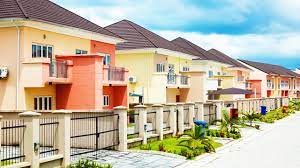The real estate sector was amongst the twenty-eight sectors of the economy which declined in the second quarter of 2022 as real Gross Domestic Product shrunk by N63.49bn quarter-on-quarter.
Although the real GDP grew by 3.54 per cent year-on-year in Q2 2022, it declined by 0.37 per cent from the N17.35tn that was recorded in the first quarter of 2021 to N17.29tn in Q2, 2022, according to data from the National Bureau of Statistics, NBS.
The NBS blamed this decline on lower economic activity that was witnessed in Q1 2021. The analysis of real GDP data revealed that only 18 of the 46 NBS captured economic activity sectors experienced growth in the quarter under review.
According to a report by Punch, the real estate sector was one of the sectors that shrunk, declining from N927.32bn to N920.49bn in the period.
In the mining and quarrying sector, crude petroleum and natural gas declined from N1.15tn to N1.09tn; coal mining grew from N1.61bn to N4.79bn; metal ores declined from N4.87bn to N1.26bn; and quarrying other minerals grew from N363.29m to N25.51bn.
The 2022 has been a tough year for the manufacturing sector with inflation and foreign exchange scarcity negatively impacting growth. Only three of the 13 subsectors in the manufacturing sector recorded any growth in the quarter under review.
Accommodation and food services also recorded a decline from N173.41bn to N68.17bn. Under the transportation and storage sector, road transport grew from N151.97bn to N293.85bn; rail transport and pipelines declined from N40.96m to 19.92m; water transport increased from N802.77m to N1.04bn; air transport declined from N25.26bn to N9.69bn; transport services grew from N7.11bn to N11.14bn; and post and courier services declined from N6.26bn to N2.42bn.
Seen as one of the bright spots of the economy, telecommunications and information services under the information and communication sector grew from N2.25tn to N2.59tn; publishing declined from N5.45bn to N4.66bn; motion pictures, sound recording and music production declined from N229.67bn to N157.57bn; and broadcasting grew from N330.47bn to N433.43bn.
The arts, entertainment and recreation sector declined from N35.69bn to N51.85bn. In the financial and insurance sector, the financial institutions subsector declined and insurance declined from N85.11bn to N80.18bn.
The professional, scientific and technical services sector fell from N560.47bn to N525.94bn; administrative and support services grew from N3.39bn to N3.54bn; public administration also grew from N283.59bn to N375.59bn, but education fell from N333.06bn to N231.85bn.
While the other services sector declined from N702.74bn to N473.72bn, the human health and social services sector increased from N126.01bn to N131.28bn.
According to Associate Professor of Economics at the Pan Atlantic University, Olalekan Aworinde, real GDP was the true reflection of the economic status of a country.
He said, “Nominal GDP is the market value of goods and services produced at a particular period. Real GDP is when you have the nominal GDP, and inflation factored in. It is the nominal GDP indexed with inflation.”
In a statement addressing the general GDP, the Founder /Chief Executive Officer, Centre for the Promotion of Private Enterprise, Dr Muda Yusuf, disclosed that productivity and competitiveness issues had continued to negatively impact performance across sectors of the economy.
He stated that the general operating environment of the nation was also very challenging for most investors, with SMEs particularly more vulnerable to prevailing macroeconomic shocks, resulting in high mortality rate for small businesses.
He said, “Many businesses are struggling to cope with the numerous challenges and shocks to the economy. On the welfare front, the citizens are also experiencing serious economic hardship as a result of the galloping inflation and the impact on purchasing power.”




